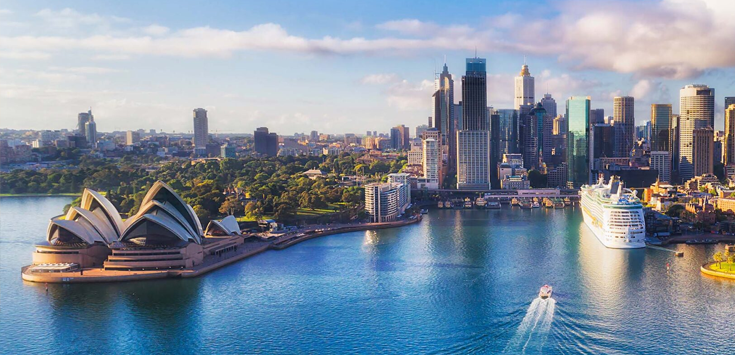.png)

Australia is one of the top destinations for international students to study abroad, known for its quality education, vibrant cities, and cultural diversity. Every year, many Nepali students choose to study in Australia for higher studies, thanks to its globally recognized universities, welcoming environment, and extensive career opportunities.
Table of Contents
Top-Rated Education
Earn your degree from globally respected universities. Australia is home to prestigious universities like the University of Melbourne, ANU, and the University of Sydney, providing Nepali students with a competitive advantage over their home country. Choose from diverse programs in business, engineering, healthcare, and IT, ensuring they acquire practical skills and experience.
Inclusive Environment
Immerse yourself in diverse cultures, enhancing your education and building lifelong friendships. Australia is known to celebrate its diversity and inclusivity, making it a supportive place for international students.
Strong Career Prospects and PR Opportunities
Prepare for your brighter future with numerous work opportunities available during and after studies. Creeate a success story in high-demand fields like healthcare, engineering, and IT and benefit from the pathways to Permanent Residency.
According to QS World University Rankings, 2024, following are the best universities in Australia:
|
Rank |
University Name |
Location |
Global Rank |
|---|---|---|---|
|
1 |
The University of Melbourne |
Parkville |
13 |
|
2 |
The University of Sydney |
Sydney |
18 |
|
3 |
The University of New South Wales |
Sydney |
19 |
|
4 |
Australian National University (ANU) |
Canberra |
30 |
|
5 |
Monash University |
Melbourne |
37 |
|
6 |
The University of Queensland |
Brisbane |
40 |
|
7 |
The University of Western Australia |
Perth |
77 |
Australia usually opens three intakes for students to apply and secure admission in universities.
|
Intakes in Australia |
Timelines |
|---|---|
|
Semester1 |
Late February/early March to late May/early June |
|
Semester 2 |
Late July/early August through to November |
|
Semester 3 |
Late October / early November through to February |
To study in Australia, Nepali students must meet specific requirements, which generally include:
Most Australian universities require proof of English proficiency, commonly through IELTS or PTE. Generally, a minimum IELTS score of 6.0 is expected by universities in Australia, though some programs may require higher scores.
You must demonstrate adequate financial capacity to cover tuition fees, living expenses, and travel costs.
The Genuine Student (GS) application is asked for applicants to demonstrate that they are genuine students. In the application, you must mention that the main reason for you to be in Australia is to study. You should also be able to show that you have the potential to contribute valuable skills to Australia after you graduate.
The Australian government demands that you as an international student must have Overseas Student Health Cover (OSHC) for the duration of your stay in Australia.
You must be able to create a realistic financial plan to manage your money while you study in Australia. Here’s an estimated breakdown of possible expenses while you live in Australia as an international student:
Tuition fees vary based on the program and university in Australia but are generally as follows:
The Australian government recommends students budget around AUD 21,041 per year for living expenses. Here’s a quick look at typical monthly expenses:
|
Expense |
Expected Monthly Cost |
|---|---|
|
Accomodation |
AUD 800 to AUD 1500 |
|
Food |
AUD 300 to AUD 600 |
|
Transportation |
AUD 50 to 150 |
|
Miscellaneous |
AUD 100 to 300 |
Flights from Nepal to Australia typically range from NPR 50,000 to NPR 100,000, depending on the season, airline, and ticket type. Booking early can help you save on travel expenses.
To study in Australia, you need to apply for a Student Visa. Here’s the visa application process:
International students in Australia can work up to 48 hours per fortnight (which is 14 days) during semesters and unlimited hours during scheduled breaks. Many Nepali students work part-time in sectors like retail, hospitality, and administration. These jobs help cover daily expenses and provide valuable work experience.
How Much Can a Nepali Student Earn in Australia?
Hourly wages for part-time jobs in Australia range from AUD 15 to AUD 25 per hour, depending on the role, location, and employer. On average, students can earn around AUD 1,200 to AUD 2,000 per month working part-time, which can help contribute in living costs.
Australia offers favourable PR opportunities for graduates in high-demand fields. Some of the best subjects to study for PR include:
Studying in these areas can increase your chances of securing permanent residency in Australia after graduation.
Australia offers Nepali students a unique combination of high-class education, work opportunities, and pathways to permanent residency. With the right preparation and guidance, your study journey in Australia can lead to exciting academic, professional, and personal growth.
Our team at Asahi International Consultancy is here to support you in every step of this journey, from selecting the right program to navigating the visa process and settling into life in Australia. Visit Us Today!


Begin a transforming journey with Asahi and
Take off with
passion and self-assurance.
ⓒCopyright 2025 Asahi . All rights reserved | Powered By:Communicate